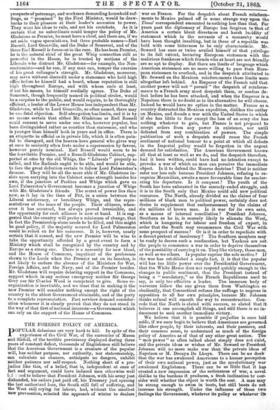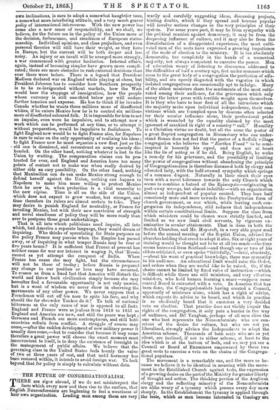THE FOREIGN POLICY OF AMERICA.
POPULAR delusions are very hard, to kill. In spite of the experience of the Civil War, of the surrender of Mason and Slidell, of the terrible persistency displayed during three years of constant defeat, thousands of Englishmen still believe that the American Government is a creature of the popular will, has neither purpose, nor authority, nor statesmanship, can calculate no chances, anticipate no dangers, exhibit neither patience nor self-respect. Nothing short of a pre- judice like this, of a belief, that is, independent at once of fact and argument., could have induced men otherwise well aed to believe that President Johnson, with his army just disbanded, his sailors just paid off, his Treasury just opening the last authorized loan, the South still full of suffering, and the West still crying for labour, had, without the smallest new provocation, selected the approach of winter to declare
prospects of patronage, and workmen demanding household suf- war on France. For the despatch about French reinforcb- ments to Mexico palmed off in some strange way upon the Times' correspondent amounted to nothing less than that. For years past the diplomacy of Europe has forgiven to that of America a certain blunt directness and harsh lucidity of statement which in the servants of a monarchy would
have been thought insulting, but in those of a republic was- held with some bitterness to be only characteristic. Mr..
Seward has once or twice availed himself of that privilege-
to its full extent, lecturing European statesmen with the- malicious frankness which friends who at heart are not friendly-
are so apt to display. But there are limits of language which American statesmen are no more willing to pass than Euro- pean statesmen to overlook, and in the despatch attributed to.
Mr. Seward on the Mexican reinforcements those limits were altogether left behind. An Emperor of the French told that another power will not " permit " the despatch of reinforce- ments to a French army must despatoh them. or confess de- feat before he has been attacked, and when the Emperor is a Napoleon there is no doubt as to the alternative he will choose. Indeed he would have no option in the matter. France as ta. country distrusted the Mexican expedition, dislikes the outlay on Mexico, and dreads a war with the United States in which
if she has little to fear except the loss of an army she has nothing whatever to gain, but France is not prepared to. accept orders from any power in existence, nor until defeated from any combination of powers. The simple- publication of such a despatch would rouse the French sentiment of national honour to a point at which all defects- in the Imperial policy would be forgotten in the urgent. demand for satisfaction. The American Government knows. all that at least as well as we do, and the despatch therefore, had it been written, could have had no intention except 'to- provoke a war of which no man can perceive the immediate object. Is it to defend the Monroe doctrine ? That is neither safer nor less safe because President Johnson, refusing to re- cognize Maxmilian, awaits a more favourable time for acceler- ating his departure. Is it conquest ? The youth of the- South has been exhausted in the scarcely-ended struggle, and. it is to the South only that Mexico could add new political resources. The North, already divided on the claims of four millions of black men to political power, certainly does not. desire to supplement that embarrassment by the olaims of six millions of brown men. Is it war for its own sake, as a means of internal conciliation ? President Johnson, Southern as he is, is scarcely likely to alienate the West, which is hungering for labour and freedom of export, in order that the South may recommence the Civil War with. some prospect of success ? Or is it in order to repudiate with a decent pretext of insolvency ? The Southern members may be ready to decree such a confiscation, but Yankee's are net- the people to commence a war in order to deprive themselves of the possibility of carrying it on. They like victory, those men, as well as we others. Is popular caprice the sole motive ? If the war has established a single fact, it is that the popular- will has too little power over the Presidential Government, that the White House does not respond quickly enough to the changes in public sentiment, that the President instead ce being a " mandatory," as the French Republicans used to- say, is only too effective a leader. The immense body of - waverers follow the cue given them from Washington so- obediently, that Connecticut refuses the suffrage to negroes in oppositiou to all her own principles, because Mr. Johnson thinks refusal will smooth the way to reconstruction. Con- cede that the North is elated with success, so elated that it. believes it can accomplish all things, and still there is no in- ducement to seek another immediate victory.
We believe that it is possible if prejudice is once laid aside, if we once begin tobelieve that Americans are governed. like other people, by their interests, and their passions, and their common sense, to understand as much of the foreign policy of America as of that of any other great nation. The " mob power" so often talked about simply does not exist,. and the private ideas or wishes of Mr. Seward or President Johnson will no more make war than the private ideas of Napoleon or M. Drouya De Lhuya. There can be no doub that the war has awakened Americans to a keener perceptimO of their own national power, just as the revolutionary war awakened Englishmen. There can be as little that it has created a new impression of the seriousness of war, a novel dislike to the burdens it produces, a fresh inclination to con- sider well whether the object is worth the cost. A man may be strong enough to swim in boots, but still boots do not increase his strength. Under the influence of those two feelings the Government, whatever its Racy or whatever its
own inclinations, is sure to adopt a somewhat haughtier tone, a somewhat more interfering attitude, and a very much graver policy of international intercourse. With the new power has come also a new sense of responsibility, and we shall, we believe, for the future see in the policy of the Union more of the decision, forbearance, and steadiness of European states- manship. Individual opinions, and class prejudices, and even personal theories will still have their weight, as they have in Europe, but the current will be both deeper and less noisy. An injury or an insult will be avenged more strongly, a war commenced with greater hesitation. Internal affairs, again, instead of becoming simpler have grown more compli- cated; there are more obstacles to rash external decisions than ever there were before. There is a legend that President Madison declared war on England while playing at chess, but President Johnson has to consider how Southern prosperity is to be re-invigorated without markets, how the West would bear the stoppage of immigration, how the people whose currency is still one-third below par will endure farther taxation and expense. He has to think if he invades Canada whether he wants three millions more of disaffected whites, if he enters Mexico how he is to control six millions more of disaffected coloured folk. It is impossible for him to act on impulse, even were he impulsive, and to attempt now a work which can be performed at any time, or to attempt it without preparation, would be impulsive to foolishness. To fight England now would be to fight France also, for Napoleon is sure to seize on the only opportunity of realizing his ideas ; to fight France now he must organize a new fleet just as the - old one is dismissed, and reconstruct an army scarcely dis- banded. On the other hand, nothing whatever is lost to the Union by waiting. The compensation claims can be prow treated for ever, and England and America have too many points of contact not to make war when really desired by either side an easy possibility. On the other hand, nothing that Maximilian can do can make Mexico strong enough to defend herself against the Union, nothing can happen to Napoleon to make him more willing to protect Mexico than he now is, when protection is a vital necessity to the new regime. Time is all on the side of the Union, which does not expect to grow weaker, but stronger, and time therefore its rulers are almost certain to take. They may desire to punish England for neutrality, or France for invading Mexico, but with their new conviction of strength and novel steadiness of policy they will be more ready than over to postpone those great undertakings. That is all into which politicians need inquire, all into which, had America a separate language, they would dream of inquiring. Who thinks of speculating for State purposes on the policy France may pursue when the Empire has passed away, or of inquiring in what temper Russia may be four or five years hence ? It is sufficient that France at present has neither cause for war nor interest in waging it, that 'Russia cannot as yet attempt the conquest of India. When France has cause she may fight, but the circumstances will not be those of to-day ; before Russia is prepared any change in our position or hers may have occurred. To reason as from a fixed fact that America will disturb the world and throw back civilization simply because she may hereafter find a favourable opportunity is not only unwise, but is a want of wisdom we never show in observing the movements of any other power. We never suppose that a Frenchman will cut off his nose to spite his face, and why should the far shrewder Yankee do it ? To talk of national bitterness as the only cause of war is opposed to all facts. England and France were as jealous from 1815 to 1851 as England and America are now, and still the peace was kept ; Germans and French are more contemptuous, and still both countries refrain from conflict. A struggle of course may come,—after the sudden development of new military power it usually does come,—but to consider that because it may come therefere a great power will choose the exact moment most inconvenient to itself, is to deny the existence of foresight in the management of public* affairs. We believe that the governing class in the United States feels keenly the value of two or three years of rest, and that until harmony has been restored within, it intends to avoid foreign war. To look beyond that for policy is simply to calculate without data.































 Previous page
Previous page